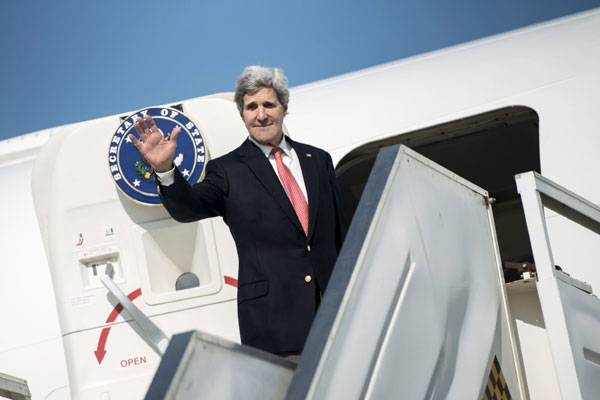

JERUSALEM -- US Secretary of State John Kerry headed back to the United States on Monday after failing to create a framework for the Israeli-Palestinian talks.
 |
|
US Secretary of State John Kerry waves as he boards his plane at Ben Gurion International Airport in Tel Aviv January 6, 2014. [Photo/Agencies] |
Kerry did however claim that progress has been made in talks with both sides and several Israeli politicians, including Foreign Minister Avigdor Lieberman and Labor chief MK Yitzhak Herzog.
Kerry operated his shuttle diplomacy, with back and forth excursions between Jerusalem and Ramallah, but it seems that both sides are looking to blame the other party for the talks' deterioration rather than trying to kick-start them.
It appears that the talks mainly revolved around the status of the Jordan valley, which is on the border between Israel and Jordan at the eastern part of the West Bank. It also brought up the highly-charged issue over the status of Jerusalem, which both people consider sacred.
Israel demands to deploy security forces at the Jordan Valley, claiming it is a security necessity, while the Palestinians vehemently oppose having Israeli forces on future Palestinian land which would damage the Palestinian sovereignty.
It seems like both sides were looking for ammunition against the other in order to blame them for the deteriorated state of the talks.
Israeli Prime Minister Benjamin Netanyahu adopted the line of " incitement" against Palestinians. He added a discussion on the " state of incitement against Israel in the Palestinian Authority" at the Israeli cabinet meeting's agenda, and said on Thursday that the Palestinians were "continuing their campaign of inciting hatred."
The Palestinians, according to reports, said that they still vehemently oppose any Israeli presence in the Jordan Valley and refuse to recognize Israel as a Jewish state.
They also denounce Israel's plans to continue to build in the settlements, causing the collapse of the previous round of talks, and a recently announced plan by Israeli ministers to annex the Jordan Valley, which awaits the approval of the Knesset ( parliament.)
Several US officials had said prior to Kerry's trip that there were no expectations of a break-through and Israeli media outlets reported that he intended to return to the region, however, no official confirmation has been given.
On Sunday, Kerry said that any future peace agreement between both sides would be "fair and balanced," and added that both leaders would have to make important decisions to advance the agreement.
"This has been a productive couple of days," Kerry said on Sunday, before leaving on a short excursion to Jordan and Saudi Arabia, adding "We had very serious, very intensive conversations. "
Peace talks between Israel and the Palestinians resumed in July, after a three year-halt, amid the repeated attempts by Kerry, who has been to the region 10 times since he assumed his position in February. The talks were given an outline of nine months, meaning until April, to reach an interim agreement.